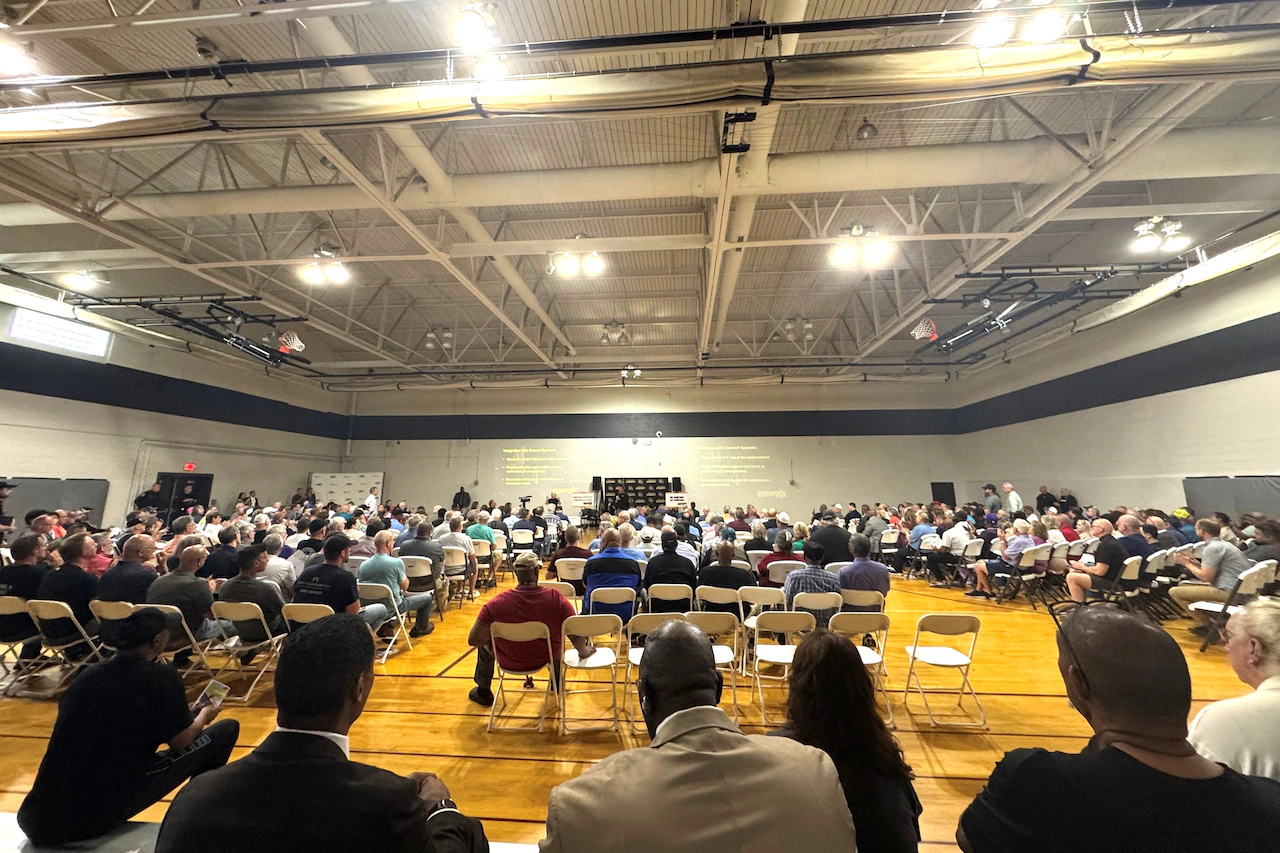
FLINT, MI — Hundreds of concerned residents and religious leaders from across the region gathered Friday, Oct. 3, to learn about ways to better protect worshippers.
The tactical briefing, for the local faith-based community, was held just days after a gunman killed four people and injured several others during a shooting and arson attack at The Church of Jesus Christ of Latter-day Saints in Grand Blanc Township.
“My heart goes out to the community,” Michigan Attorney General Dana Nessel said during the event. “My heart goes out to the LDS community. My heart goes out to those who lost their lives, people who are still suffering from injuries.”
Nessel and Genesee County Sheriff Chris Swanson led the event, which took place at Genesee Health System, 1040 W. Bristol Road in Flint.
“We are here today to answer some questions,” Swanson said. “What are you doing that’s working, and what do you need to do to keep your flock safe?”
There was a heavy police presence at the event, with several agencies providing security, including the Genesee County Sheriff’s Office.
Additionally, the building was swept prior to the event.
Attendees heard from several speakers who provided advice on how to prevent tragedies like the Sunday, Sept. 28 attack from happening again in the future.
“The reality is it could happen and that denying violence is not going to save lives,” Swanson said.
Among the attendees at Friday’s event was the Rev. Jeff Frechette of St. Mark Lutheran Church in Flint.
“I felt it was important for our people to know that we take their safety seriously, while at the same time not reacting with fear but being wise and being wise with the lives that God has given us,” Frechette said.
The pastor said that while his church already has surveillance equipment in place, he plans to work on strengthening the communication aspect of his church’s emergency preparedness.
Another attendee, Beth Gray, a trustee at Goodrich United Methodist Church, said she came to the event because she felt it was her responsibility as a member of her church’s board — especially considering Sunday’s attack.
“Some of those things, we could do immediately, things like locking the doors and having somebody monitor,” she said referencing suggestions made at the event.
Nessel stressed the importance of responding to threats before it’s too late, urging attendees to immediately report any suspicious activity or potential red flags.
“There are little windows of opportunity where a potential criminal can be reached and stopped before tragedy occurs,” Nessel said. “If you see something concerning, please bring it to our attention at the earliest opportunity. It may not be a crime, but it may be an opportunity for some other form of intervention.”
Nessel said religious leaders are allowed to bar anyone who makes other worshippers uncomfortable or poses a potential threat to places of worship.
While most places of worship are open to the public, they are private, she said.
“I know it’s a tough thing to do, but just sometimes it has to be done,” she said.
Nessel also spoke on how to properly report hate crimes and civil rights violations.
The FBI opened a civil rights case regarding the Grand Blanc Township church attack within hours of the incident, Swanson said.
“Freedom of religion was attacked,” he said.
Nessel noted that about 620 hate crime incidents occurred in Michigan in 2024 alone, reflecting an overall rise of such crimes.
“Victims of a hate crime often do not contact law enforcement because they don’t know about the services that are available to them,” Nessel said. “They distrust the judicial system (and) they fear further retribution against their family or businesses or themselves.”
For those looking to arm themselves against potential future attacks, worshippers can receive special permission to carry firearms within a place of worship if they have a concealed carry license, Nessel said.
Attendees were encouraged to prepare for potential attacks by conducting threat assessments, controlling access to buildings, building strong relationships with law enforcement, surveillance, and creating evacuation plans and maps.
“You should do walks around your building every day, see if anything changes, see what’s going on,” said Lt. Rudy Lopez of the Genesee County Sheriff’s Office. “We have to know what’s going on in our building.”
When all other precautions against an attack fail, those under attack should either run, fight or hide, said Genesee Sheriff’s Deputy Dustin Roy.
“You have no clue how you’re going to react at that point,” Lopez said. “When it comes to knowing how to run, hide, and fight, if three people in an organization know it but the members do not, then it’s not going to work.”
Roy, a paramedic with the sheriff’s office, said places of worship should always have medical kits and AEDs (Automated External Defibrillator) on site.
Another speaker at the event, Genesee Health System CEO Dan Russell, shed some light on the mental health aspect of attacks like the one that occurred Sunday.
“The worst thing you can do is try to forget about it and just think it’s going to go away with time because usually that does not work,” he said.